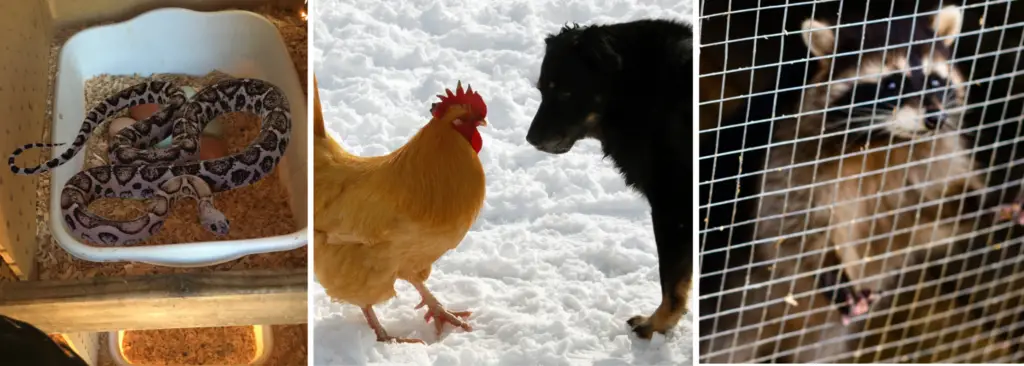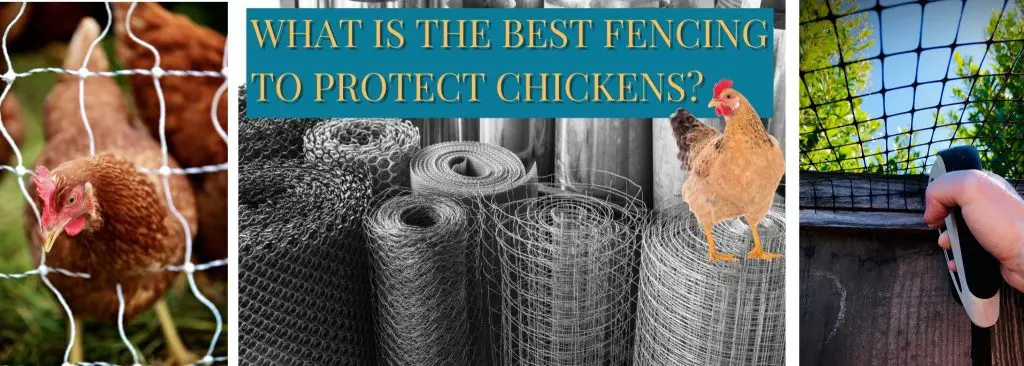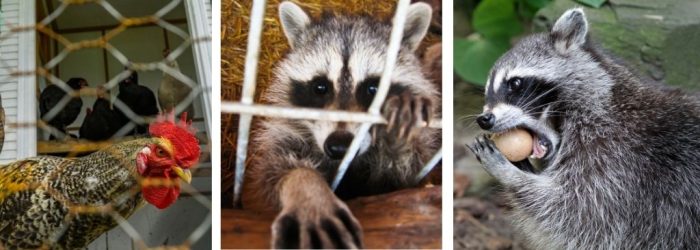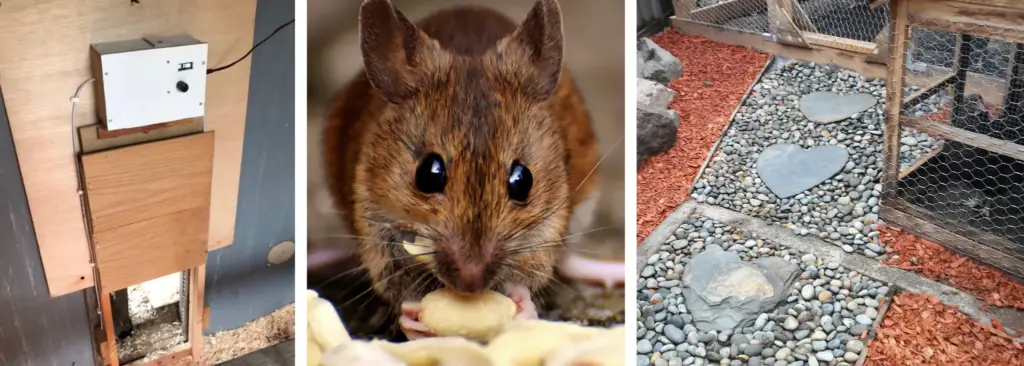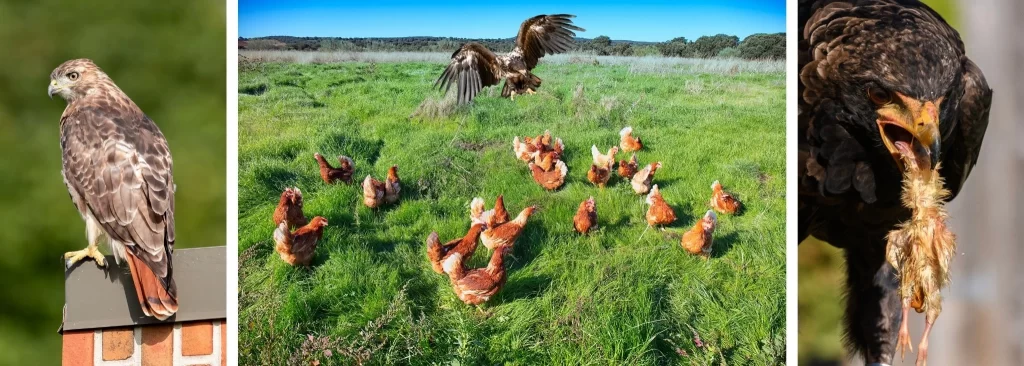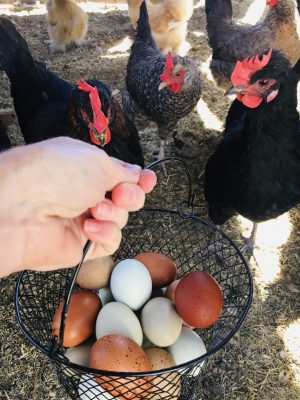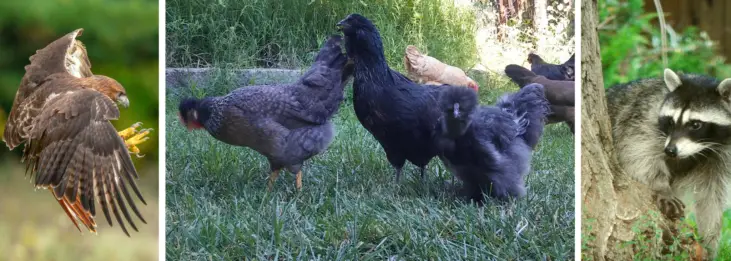
You have invested a lot of time into your flock and the last thing that you want is to lose them to predators. It is important to know how to protect your chickens, what they are at risk of being attacked by and to take precautions from being attacked in the first place.
What Animal Will Kill Chickens?
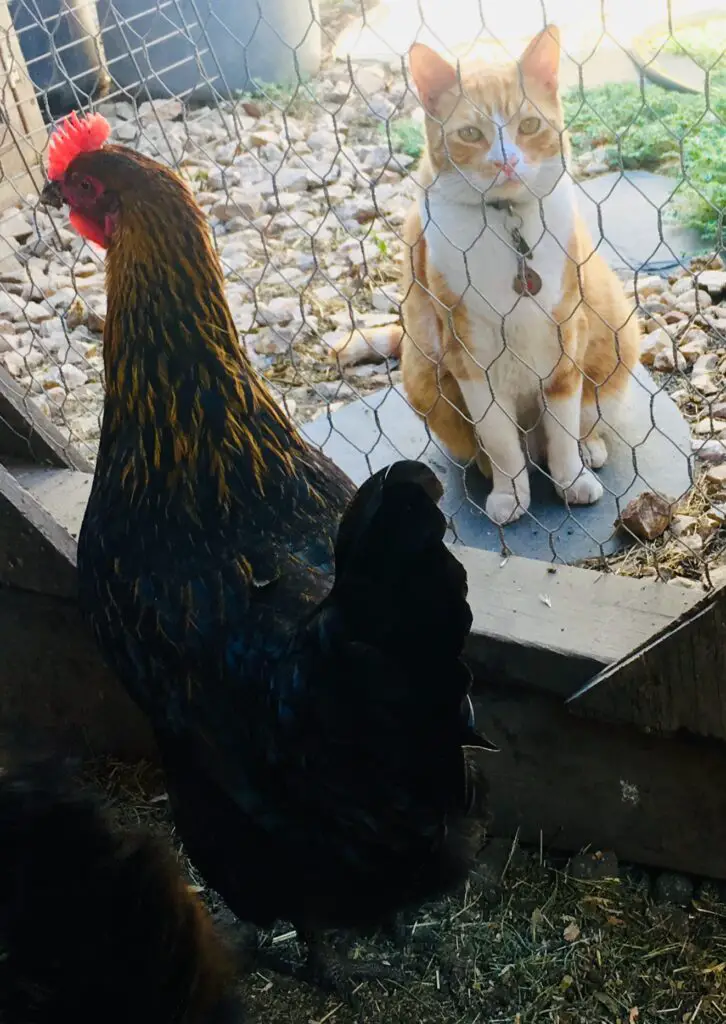
As a chicken owner, you probably have worried about losing your flock to predators. The following are the most common predators that you should keep a lookout for and protect your chickens from:
| TOP CHICKEN PREDATORS |
|---|
| DOGS – Even “friendly” dogs can unexpectedly attack your flock. |
| CATS – Free ranging chickens are prone to attack from even neighbors cats. Best to keep a rooster to alert your hens. |
| RACCOONS – sneaky predators can also unlatch and open a gate |
| OPOSSUM – can reach their sharp claws/ hands through chicken wire and eat what they can…..left out chicken feed, eggs, chicken. |
| RATS AND MICE – can get through chicken wire, chew chicken feet of chickens that aren’t perching on low perches |
| BIRDS OF PREY: HAWK / OWL – can easily attack, kill and eat a chicken. |
| SNAKE – often seen getting into coops at night and stealing eggs. |
| BEAR – will destroy entire chicken coop, eat eggs and chickens |
| SKUNK – kills multiple chickens at once, putting the rest of the flock that survived at risk of developing any diseases that the skunk may have passed on to them |
| BOBCAT – often attack chickens early evening or at dawn |
| COYOTE – are known to eat an entire flock |
| FOX – will stalk your flock and swiftly attack and eat up to 30 chickens at a time |
Do You Know How to Protect Your Chickens?
If you have a flock of chickens or are thinking about getting some, then this is the right article for you. Whether you have raised them from day old chicks or purchased them as adults, it would break your heart to find them torn apart in the safe haven of their own coop. Now is the time to take precautions and protect your fluffy butts, BEFORE a predator gets to them first.
1. Check Chicken Wire Around Perimeter for Damage

Check chicken wire around the whole perimeter of your coop. Not just low areas, but up above in the eves as well. Predators can get into the coop from the roof area as well.
Predators such as raccoons and opossums will try to bend the chicken wire to get through. Be vigilant about inspecting that all areas are secure. Use your staple gun to reattach wire that has come loose.
“Chicken wire” is not predator proof. It will protect your chickens from getting out, but not predators from getting in.
It would be a good investment to build your chicken coop with hardware cloth, instead of chicken wire. It is more expensive, but well worth the investment.
Hardware cloth is actually a wire mesh. It is made of steel, stainless steel or galvanized steel and it has square openings anywhere from 1/4″ to 1″, much smaller than chicken wire.
Save your leftover scraps, at least 12″ width, for installing around the perimeter of your coop! (See below)
2. Install Predator Proof Materials Around Perimeter
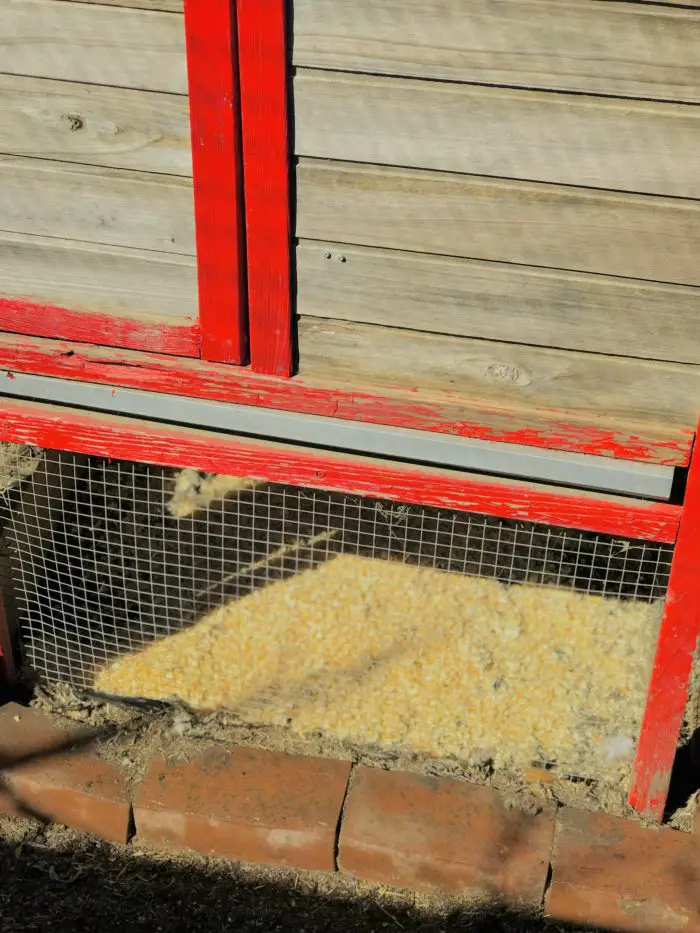
Installing hardware cloth will help stop predators from getting through your coop, but not under and into it.
The perimeter around the chicken coop should not allow for predators to dig under to get into the coop. Use hardware cloth, burying about 12″ around the perimeter of the coop.
Combining the use of hardware cloth and placing bricks, rocks or pavers around the perimeter is one of the best ways to prevent predators from getting under and into your coop.
Placing anything around the perimeter is better than nothing. If all you have is bricks, use them!
3. Check Gate Latches
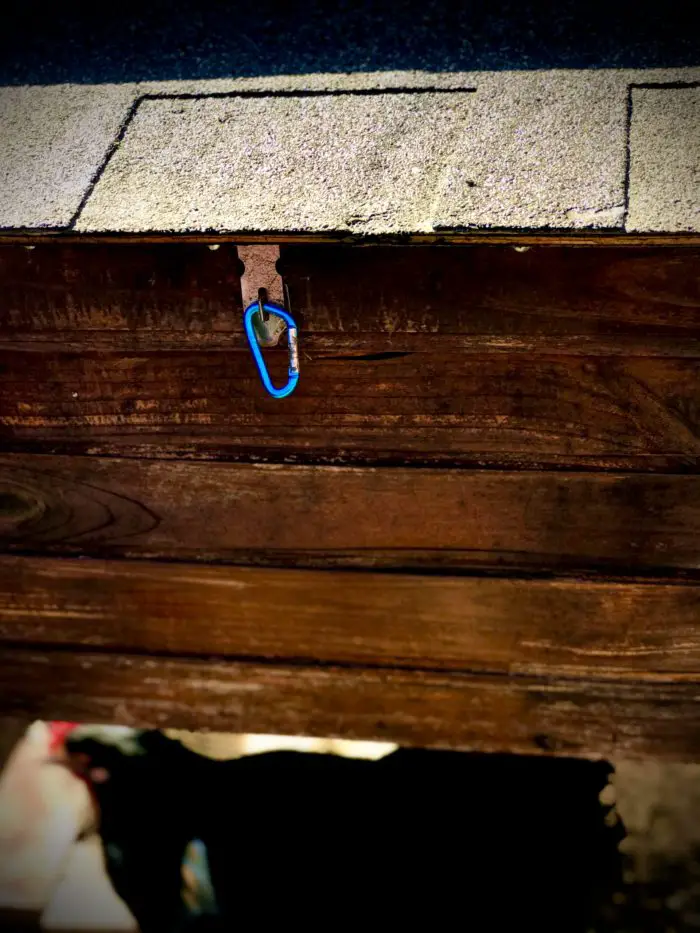
Check all gates and latches. Are your gates closing securely? Are all latches in your hen house secure? This includes a latch that you should have on your hen boxes. Predators such as raccoons and snakes especially like to get into the nest boxes to steal eggs that were not collected from the day before.
Raccoons can easily open a gate or slide a latch, to get access to inside a chicken coop. Install two step latches, to make breaking in more difficult for them.
You can purchase a pack of carabiner latches at your local dollar store. Check out my article 23 Important Chicken Coop Supplies – Purchase at the Dollar Store.
4. Remove Uneaten Food Daily
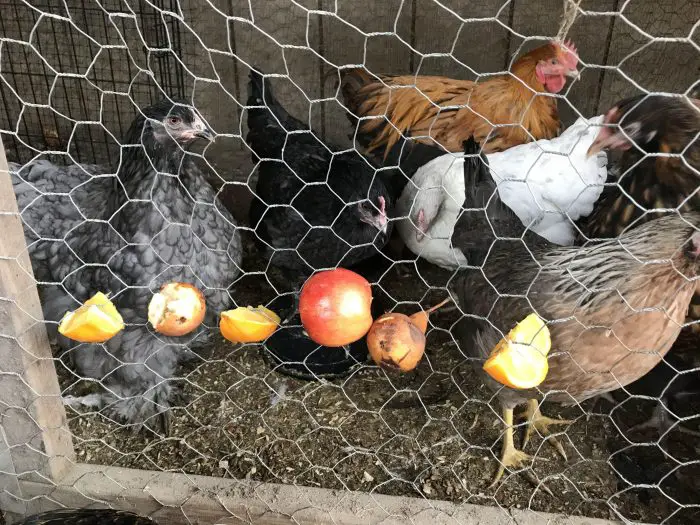
Take in uneaten food at the end of each day. Any food left in the coop at night attracts rodents such as rats, mice, raccoons as well as bears, etc.
Predators will do whatever they can to gain access to the coop, including gnawing holes in your coop. Bears will just knock your whole coop down.
Remove all chicken feed from your coop and cover the water. Don’t give predators any good reason to break in.
Rodents can chew through plastic, so store your chicken feed in metal garbage cans with secure lids.
5. Collect Eggs Before Dusk

Eggs are food too. Sometimes hens wait until the late afternoon to lay. Make sure that you take one last look later in the day for any eggs. Leaving them in the nest box is an invitation to a predator.
All it takes is one time to leave eggs in your coop for a predator to notice. It may keep making visits to the coop until it succeeds in breaking in.
6. Inspect Hawk Netting for Holes
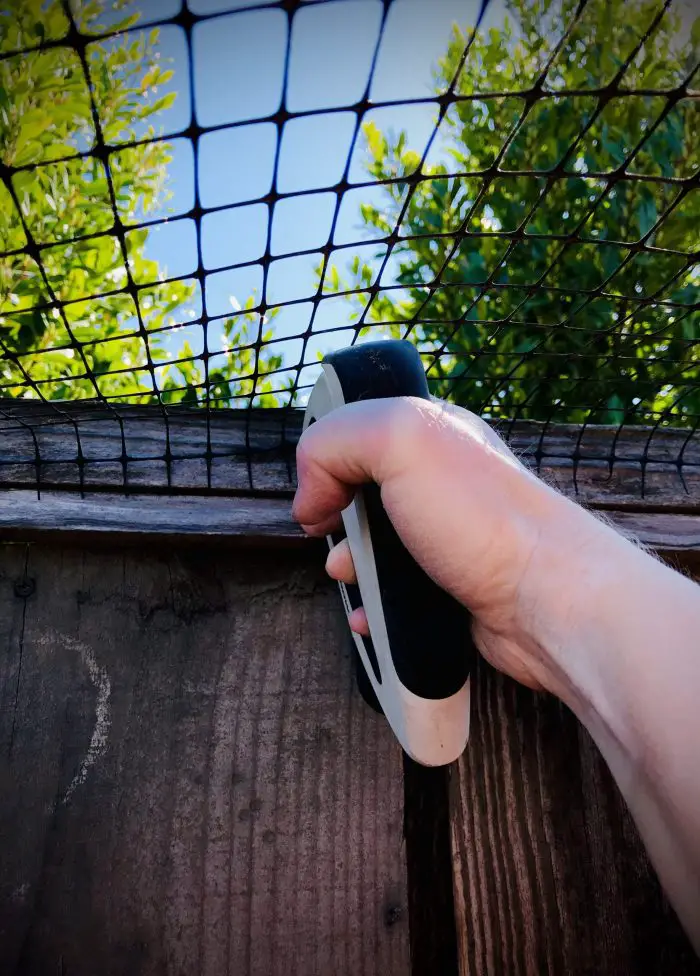
Hawk netting needs frequently checked as well. While it works great at deterring any birds from getting through to get at your chickens, it doesn’t do any good if it is broken.
Routinely check this and make repairs as needed. Every once in awhile I need to make repairs. This is most likely from branches, cats and possibly predators pushing down or walking on it. Nothing that a little staple gun can’t fix!
Extra Security
- Video cameras
- Automatic chicken door
- Electric fence.
- Statue or decoy animal
- Hawk netting
- Hanging CD’s
- Pinwheels
- Rooster
- Guard dog
7. Check Video Cameras
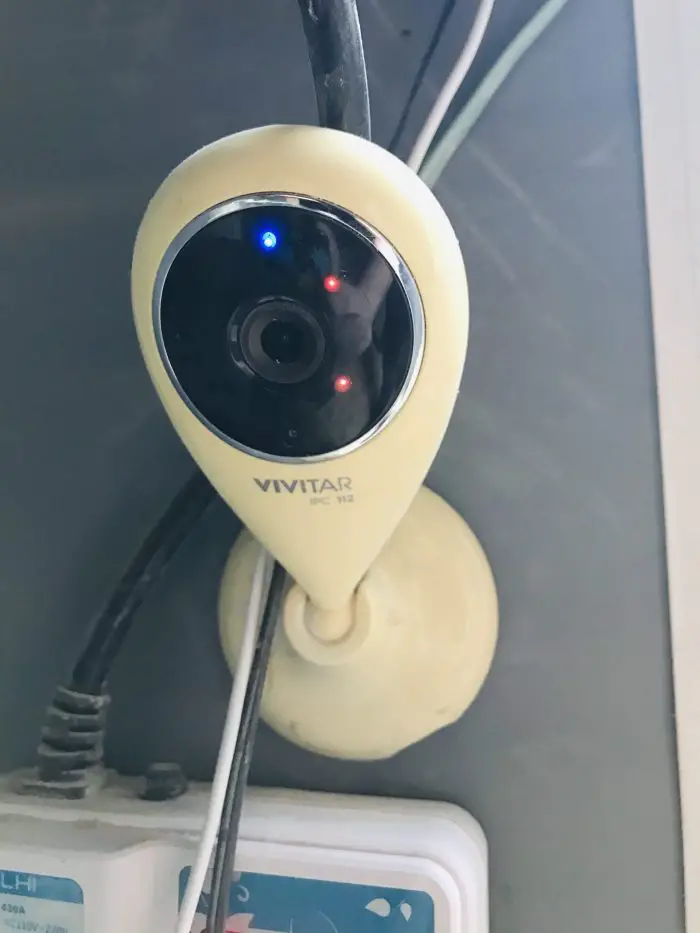
Many flock owners also have video cameras installed in and around their coop. Position them so you can see predators that may be lurking around your coop at night.
I also position one camera on my nest boxes, so I can see if there are any eggs that need collected. This can save you a late night trip out to the coop if it’s not necessary.
Make it a point to check that each of your cameras is working properly. Unplug them and clean the cords of dust and cobwebs.
8. Check Automatic Chicken Door
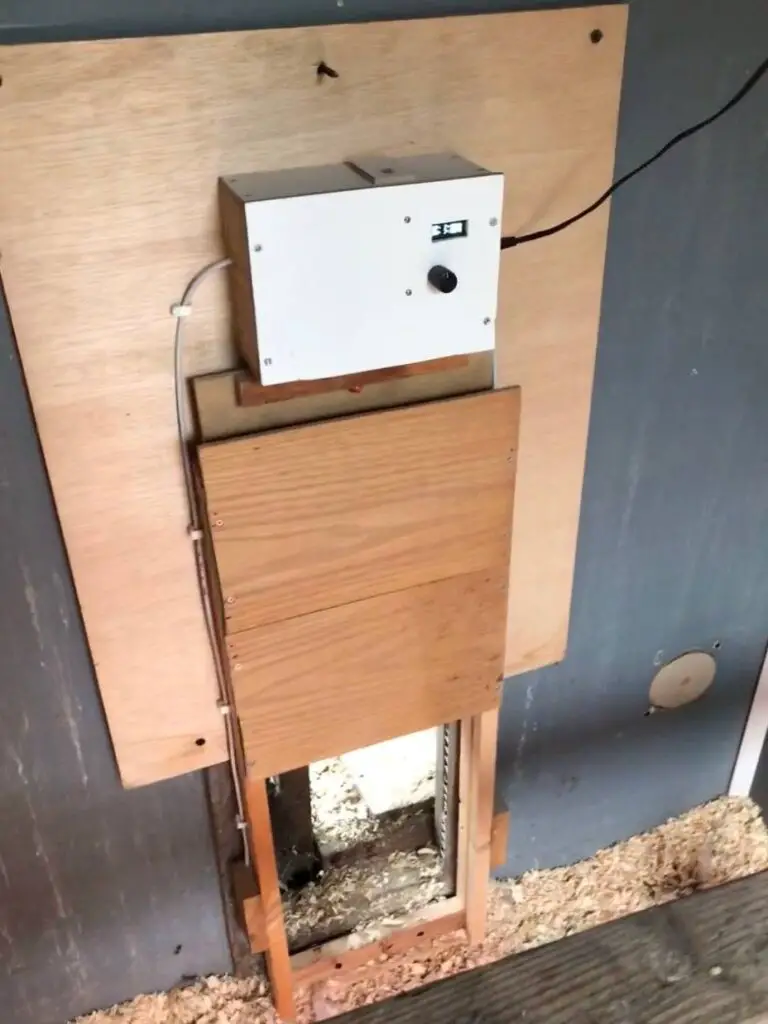
Automatic chicken doors are great! I am blessed to have a Dad that designed and made a couple for me. They have made raising backyard chickens SO MUCH EASIER!
Some designs work to automatically go up at sunrise and down at sundown. Others, you can set the time up and time down. Automatic chicken doors can get pricey, but it’s a good investment.
I prefer being able to set the time up and down on my own because I do not want my chickens out at the crack of dawn singing their egg laying song!
Is the automatic chicken door working properly? Does it go up and down at the proper times? Also, make sure that it is closing completely and that predators cannot lift the door. Raccoons especially are good at doing this.
9. Check Electric Fencing
Electric fencing is one way to protect both your flock from getting out and also from predators from getting in. This includes large animals such as bears, bobcats, coyotes, etc.
Electric fences run a current through it and if touched by either your chickens or a predator will give them a zap, enough to deter the predators from getting in and your chickens from getting out.
If you have electric fencing, check to make sure that it is working properly. Use an electric meter to make sure that it is emitting the proper amount of electricity.
Chicken Coop and Run Checklist
| ✔️ | CHECK AUTOMATIC CHICKEN DOOR |
| ✔️ | CHECK CHICKEN WIRE FOR DAMAGE AROUND PERIMETER |
| ✔️ | INSTALL PREDATOR PROOF MATERIALS AROUND PERIMETER OF COOP |
| ✔️ | CHECK GATES AND LATCHES |
| ✔️ | REMOVE UNEATEN FOOD DAILY |
| ✔️ | COLLECT ALL EGGS BEFORE DUSK |
| ✔️ | CHECK / CLEAN VIDEO CAMERAS |
| ✔️ | CHECK ELECTRIC FENCING |
| ✔️ | CHECK HAWK NETTING |
All of these items should be checked frequently and repairs should be made as soon as possible to avoid predators from attacking your chickens.
Other Popular and Simple Ways to Protect Your Flock
- Rooster
- Guard Dog
- Pin Wheels
- Hanging CD’s
- Playing Music/Radio
CONCLUSION: KNOW HOW TO PROTECT YOUR CHICKENS
As a flock owner, it is our responsibility to make sure that our chickens’ needs are attended to and this includes their SAFETY. This means knowing what predators your flock is at risk of being attacked by in your area and taking measures promptly to correct them.

